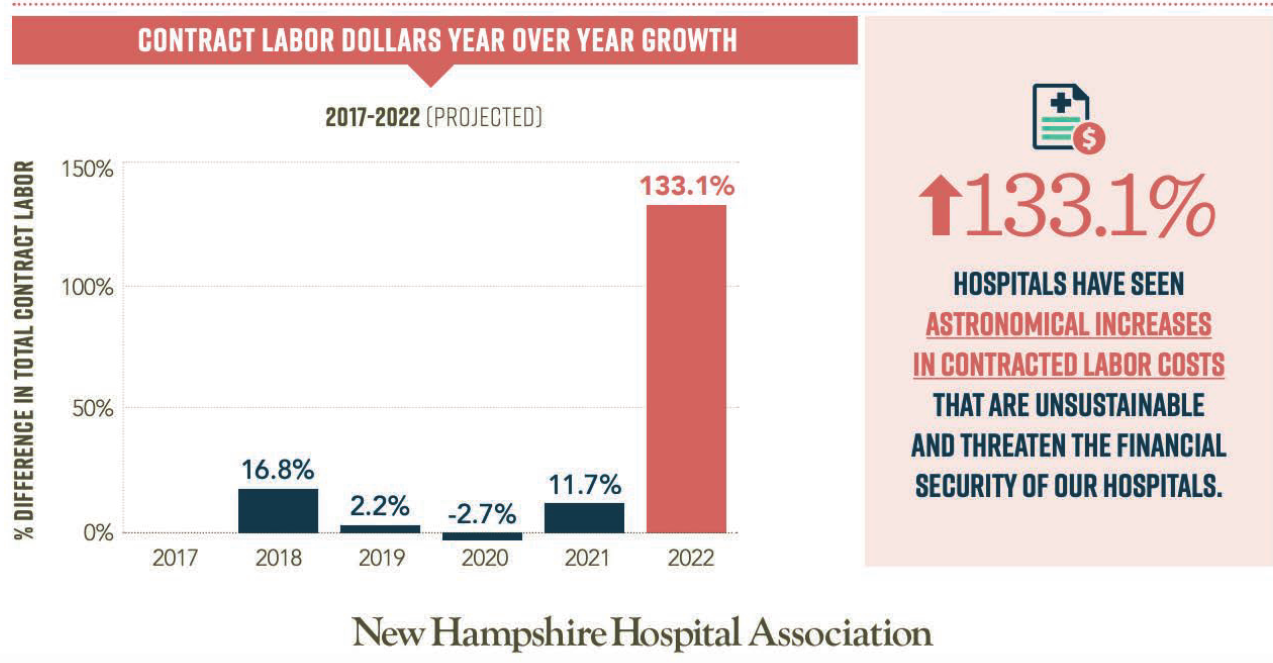The state’s health care industry had to get creative after the pandemic exacerbated pre-existing workforce shortages, doubling the vacancy rate for nurses and LNAs between 2019 and 2022, according to the New Hampshire Hospital Association.
Employers offered generous signing bonuses and paid training. The state made it easier for out-of-state practitioners to get a New Hampshire license. A team of health care leaders developed 107 strategies to recruit and retain workers.
New England College’s response was to create a new nursing program that benefits students and the state’s hospitals well before students graduate.
Students spend two-thirds of each school year on academics and the rest in a hospital, working two shifts as a paid LNA and one alongside a nurse, gaining real-world experience. Meanwhile, hospitals gain a much-needed LNA who they hope will stay on as a nurse when they graduate. Cheshire Medical Center in Keene is the most recent hospital to collaborate with New England College since it launched the nursing program in the fall of 2022. It joins Concord Hospital, Catholic Medical Center and Elliot Hospital.
Angie McPhee-Smith, dean of nursing and health professions at New England College, said the hospital was able to retain 71% of students in LNA positions, reducing the vacancy rate for those jobs from 23% to 7% It’s an especially important pipeline for hospitals that have had to fill vacancies with more expensive travel nurses. According to the NH Hospital Association, hospitals are spending nearly 130% more on contract labor than they did in 2019. That helped drive labor costs for the state’s 23 acute care hospitals from $3.7 billion in 2021 to $4.1 billion in 2022.
Getting students into hospital settings for three 14-week rotations during the program gives them deep experience that a traditional six- or seven-week placement cannot, McPhee-Smith said.
That’s especially true, she said, given that students are “hip to hip” with their nurse for a weekly 12-hour shift.
“They get an authentic experience and it gives them a better picture of what it will be,” McPhee-Smith said. “Those students who go through a traditional program graduate and are thrown into this environment you never really entered, so it’s a little bit of a transition shock.”
According to the American Nurses Association, 18% of newly licensed nurses quit within their first year, because learning a new job in a pressurized environment can be so challenging. Carolyn Isabelle, director of workforce development at Dartmouth Health, which includes Cheshire Medical Center, said a program like New England College’s can help with that.
“It definitely supports the transition into practice when they have had the opportunity to work in the environment,” she said. “They understand our medical records. They even understand our culture and the way things happen within our hospitals. And, it does make for an easier transition to the team.”
Dartmouth Health has partnered with Colby-Sawyer College’s nursing programs for decades under a different model and consistently offers jobs to all nursing school graduates. On average, 500 nursing students train with Dartmouth Health a year, Isabelle said.
Its recruitment and retention efforts also include paid training through the Dartmouth Health Workforce Readiness Institute for a variety of positions, including LNAs, medical assistants, pharmacy technicians, surgical technologists and phlebotomists.
Concord Hospital is also offering training and apprentice-type programs for LNAs, medical assistants and nurses, said Dawn Beers, the hospital’s public affairs manager. The hospital also recently hired 49 new nurses who graduated through a separate nurse residency program.
“I feel like the whole key to addressing the workforce shortage is that we need to have multiple points of entry so that there’s not one direct path that gets you to the end goal of becoming a nurse or becoming a respiratory therapist,” said Isabelle. “You could start as an LNA, a medical assistant, a pharmacy technician, gain some experience, some knowledge, start working and build a reputation with your organization, and then, continue your education and upskill over time.”
“I think health care is a rewarding field,” Ryan Hornblower of Henniker said. “It’s not one that you always get thanked for, but there are things that happen that make you feel good, that you did the right thing. That you made a difference in someone’s life.”

As the pandemic led people to leave health care jobs, hospitals had to rely on more expensive contract labor, such as travel nurses, more than ever. (Courtesy of NH Hospital Association)